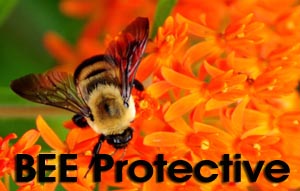27
Nov
A Time to BEE Thankful
(Beyond Pesticides, November 27, 2013) You can almost taste it: the moist, tender turkey, the fluffy mashed potatoes, the creamy green bean casserole, the perfectly seasoned stuffing, the roasted brussel sprouts sprinkled with salty bacon, the sweet tang of the cranberry sauce, and the velvety bite of the pumpkin pie. Thanksgiving and all its bounty is almost here.
Of course, the impending feast doesn’t magically appear. Whether you have merely observed the bustle of preparation, assisted with the pealing and chopping, or orchestrated the entire affair, it is well known that the hard work of many lies behind the tantalizing spread.
And if your Thanksgiving tradition is like most gatherings across the nation, before you carve the turkey, scoop the mashed potatoes and stuffing, serve up the salad, and ladle the gravy all over your plate, there is a moment of pause. Be it in the form of prayer, song, or simple sharing, it is a moment honoring the purpose for this great celebration. It is a moment to stop and be grateful for the bounty before you and the friends surrounding you. It is a moment to give thanks for the hard work of those who prepared the great feast.
In this moment of thanks, however, the gratitude towards those responsible for the plentiful spread often falls short. The hard work is not confined to the kitchen walls and grandmothers’ hands. And while some individuals and families may take a moment to think beyond the kitchen and thank all the multitude of hands responsible for growing, harvesting, and transporting the food behind each bite, most will not think to thank one of the smallest workers: bees.
That’s right. Bees. One in three bites of food rely on the tireless pollinating efforts of this small but mighty insect. Combine that with recent U.S. Department of Agriculture (USDA) assessments that pollination contributes between $20 and $30 billion in economic value to agriculture each year and you have not only a necessary link of the food production chain, but an economically valuable one as well.
Imagine if you will your Thanksgiving dinner without the help of this small but invaluable worker. That tangy and sweet cranberry sauce? Gone. Those crispy morsels of onion on top of the green bean casserole? History. Those honey-sweetened carrots? Extinct. And last but not least, the pumpkin pie and cup of coffee you somehow make room for in your stomach? A figment of your imagination.
As strange as a Thanksgiving without pumpkin pie or any of these staples might seem, it is an all-too-real scenario we might face in the coming years. See much like the Pilgrims””the very individuals to whom our Thanksgiving Holiday pays homage””bees are facing a significant challenge of survival. Each winter since 2006, one-third of the U.S. honey bee population has died off or disappeared, which is more than twice the normal rate. Just this past summer, bumblebees suffered the single largest known incident of death in this country.
Unlike the Pilgrims, however, the decline and mass die-offs of these pollinators are not attributed to natural elements, disease, or a lack of understanding how to find or produce food in a new environment. Instead, the decline has been linked to the excessive and unnecessary use of pesticides at both the residential and commercial levels. Classes of pesticides commonly found in lawn and garden products and used in agriculture, such as neonicotinoids and synthetic pyrethroids, threaten bees existence by weakening immune systems, impairing reproduction, and killing off foragers. Even worse is that little is being done at the federal regulatory level to reverse this decline and take steps to protect bees and other pollinators.
Offer a Helping Hand to the Bee Colonies
The bees need help and they need it now. In the spirit of Thanksgiving, Beyond Pesticides along with the U.S. Fish and Wildlife Service and other environmental groups, urge you to not only stop and thank the smallest workers for the marvelous feast spread out before you, but to take a page from Pilgrim’s history and offer a helping hand so that such a feast can continue for your family and friends in the future.
At Beyond Pesticide’s BEE Protective campaign website, you will find a host of resources, information, and advocacy tools that can be used to stop the decline of pollinators and strengthen protective regulations. Become a backyard beekeeper, establish a “Pesticide Free Zone” in your yard or local park, choose organic produce (starting with that mouth-watering Thanksgiving spread), and most importantly, let Congress and other regulators know that bees and other pollinators deserve our protection, help, and thanks.
Happy Thanksgiving!
All unattributed positions and opinions in this piece are those of Beyond Pesticides.











While the pesticides are without a doubt the main culprit, there are other factors as well.
December 2nd, 2013 at 11:46 pm– the monocultures- bees need diversified diet in order to stay healthy
– the constant moving of the colonies with the crops- causes stress and weakens the body.